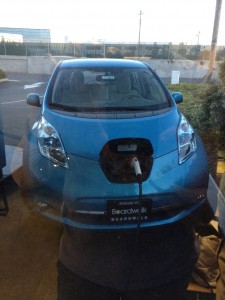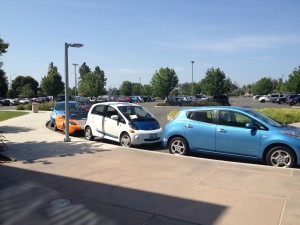I am often uncomfortable with the decision of American Jews I know who decide they need to support right wing US politicians because of the unambiguous support these politicians have toward the state of Israel. As a strong supporter of Israel, I feel it’s very dangerous for us Jewish Americans to support political positions in places where we don’t live and don’t suffer the consequences of our support.
I’d like to encourage a new paradigm for American Jews who strongly support Israel: be pioneers in technology in support of solutions in the Middle East. The best solution for Israel, in my opinion, would be to eliminate the need for imported oil from the middle east. If the US and Europe were to move rapidly to oil-less technologies, the political landscape of the middle east would shift quickly. How can we reduce oil? Do you drive? If you’re a one car family, look at the Plug-in Toyota Prius, the Chevy Volt or consider joining a car sharing program such as Zipcar for trips longer than 40 miles. If you’re a two car family, consider making your primary car an all electric car like the All-electric BMW ActiveE, the Nissan Leaf, the Mitsubishi i-MiEV or the Tesla Model S. You’ll feel like a pioneer, and yet you’ll have a great ride in any of these. Push the envelope, be out of your comfort zone, try all electric if you can. The only way to get electric cars into the US mindset is for people to drive them and encounter real issues like I need to plug it in, do you have a plug? As pioneers, we can demand the infrastructure that others will use in the future. Talking to other Leaf owners, every one I’ve communicated with will NEVER go back to an internal combustion engine.
Next, in the last few years there has been a radical shift in solar electric technology for your house in a very strange and positive way: Leasing your solar system. In the San Francisco bay area, a company called Solar City will put solar panels on your house for free! You then buy the power you produce back from them. I just got a quote from Solar City that if I put zero down, I can put back the electricity I produce for a 4 cent discount (14 cents per kilowatt) with a 3-4% increase in the cost of electricity over 20 years. If I put $6,000 down, I will produce 1/3 of my electricity at 9 cents a kilowatt fixed for 20 years. I’m currently paying 18 cents a kilowatt. How does this help? On demand power systems on the grid use oil to produce on demand power. This power demand peaks at 2-4 in the afternoon, precisely when you’ll be producing electricity for the grid! Solar City will guarantee your production since they are the utility providing the power to the grid. Win, Win, Win!
The last suggestion I have about moving off an oil economy is to try to eliminate oil from the food we buy. Michael Pollan documented the link between food and oil in The Omnivore’s Dilemma: A Natural History of Four Meals . In the 1970s Richard Nixon, determined to never have food scarcity become a political issue, changed the farm subsidies to allow for corn and soybeans to be produced as much as possible. With advancement in mechanized farming (using oil), and generically modified seed, and fertilizer (putting oil on the soil), we were able to produce VAST quantities of corn and soybeans. Corn became so cheap that non-traditional uses expanded; therefore the nightmare that is High Fructose Corn Syrup was born. It became so cheap that animals were fed corn; a beef steer normally eats grass, but in the last 30 years, beef steers have been moved off the farm (so more corn could be grown) and fed corn in Concentrated Feed Lots (CAFO’s). Amazingly, these animals can only be fed corn for a short period of time since it’s literally killing them. So we removed fertilizer from the farm (cow poop), replaced it with oil, and now have a HAZMAT condition at the CAFOs where huge quantities of poop need to be cleaned up. How can you help reduce oil? In the last 5 years we’ve had a revitalization of Kosher pasture raised animals. Since the agriprocessor scandals of the 1990s Kosher Jews who pay attention to their food source have come to recognize that we need a new way. Two fledgling companies are providing Kosher meat that is raised on pasture. Grow & Behold and Kol Foods are both east coast companies that offer west coast buying clubs (my hope is that if enough west coast Jews buy from these companies they will be able to start a more local operation here on the west coast). Local, organic farmers market foods, and buying local in season foods will go a long way in removing the rest of the oil from your food.
. In the 1970s Richard Nixon, determined to never have food scarcity become a political issue, changed the farm subsidies to allow for corn and soybeans to be produced as much as possible. With advancement in mechanized farming (using oil), and generically modified seed, and fertilizer (putting oil on the soil), we were able to produce VAST quantities of corn and soybeans. Corn became so cheap that non-traditional uses expanded; therefore the nightmare that is High Fructose Corn Syrup was born. It became so cheap that animals were fed corn; a beef steer normally eats grass, but in the last 30 years, beef steers have been moved off the farm (so more corn could be grown) and fed corn in Concentrated Feed Lots (CAFO’s). Amazingly, these animals can only be fed corn for a short period of time since it’s literally killing them. So we removed fertilizer from the farm (cow poop), replaced it with oil, and now have a HAZMAT condition at the CAFOs where huge quantities of poop need to be cleaned up. How can you help reduce oil? In the last 5 years we’ve had a revitalization of Kosher pasture raised animals. Since the agriprocessor scandals of the 1990s Kosher Jews who pay attention to their food source have come to recognize that we need a new way. Two fledgling companies are providing Kosher meat that is raised on pasture. Grow & Behold and Kol Foods are both east coast companies that offer west coast buying clubs (my hope is that if enough west coast Jews buy from these companies they will be able to start a more local operation here on the west coast). Local, organic farmers market foods, and buying local in season foods will go a long way in removing the rest of the oil from your food.
I strongly feel the best way American Jews can support Israel is to break our oil addiction however we can. I know I’m a goofy lefty, but doesn’t eliminating oil make me a conservative?
-Bill




